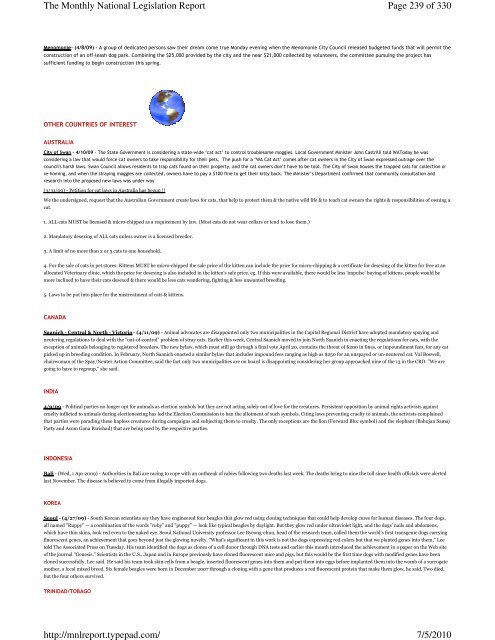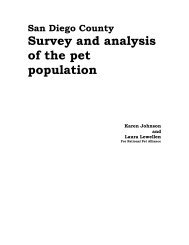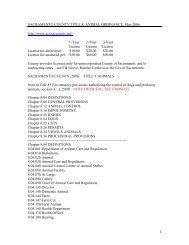<strong>The</strong> <strong>Monthly</strong> <strong>National</strong> <strong>Legislation</strong> <strong>Report</strong>http://mnlreport.typepad.com/<strong>Page</strong> 238 <strong>of</strong> <strong>330</strong>7/5/<strong>2010</strong>put this into statute so we will have the proper tools to avoid these problems." <strong>The</strong>re weren't enough no votes to kill the legislation. "It's a matter <strong>of</strong> enforcement. Those pictures that we'veseen, the horrific conditions that we've seen, are already addressed under law," said Republican Judy Warnick. Warnick wanted to see legislation that covers all animals, not just dogs readyto breed.Tacoma - (4/8/09) - An incident last week when a sheriff's deputy was stuck with two reported dangerous dogs in the back <strong>of</strong> his patrol car exposed a gap in Franklin County's animalcontrol policies. Undersheriff Kevin Carle relayed the incident to county commissioners on Monday to illustrate the urgency <strong>of</strong> beefing up the county's animal control. "This isn't a want. This isa need," Carle said. "And we've needed it for some time." Recently, the sheriff's <strong>of</strong>fice has hired Happy Camp Kennels for assistance on a per-call basis. Although closed to the public, thebusiness still is available to assist the county, Carle said. <strong>The</strong> business is run by Angela Zilar, who also runs A2Z Animal Sheltering Services, the animal control contractor for the Tri-Cities.But when the sheriff's deputy picked up the two dogs Thursday, he couldn't reach Zilar because she was on vacation. So the deputy held the dogs in the back <strong>of</strong> his car for three hours whilehe called shelters and veterinarians looking for one to take them. <strong>The</strong> sheriff's <strong>of</strong>fice has a similar lack <strong>of</strong> options when it receives calls about dogs that aren't dangerous, but are abandonedor injured. <strong>The</strong> county doesn't have an ordinance or resources devoted to nondangerous dogs. In such instances, the sheriff's <strong>of</strong>fice tells callers to seek help elsewhere. Carle occasionallyhas encouraged them to call a county commissioner. <strong>The</strong> sheriff's <strong>of</strong>fice averages two to three dog calls per month, Carle said. That jumped to eight to 10 in October, probably linked to thefaltering economy, he said. <strong>The</strong> Clark Addition generates the majority <strong>of</strong> the calls, he said. At the very least, the deputy's situation Thursday underscored the need for the county to get aformal contract for assistance with dangerous dogs, Carle said. Such a contract would obligate the business to arrange backup animal control assistance when the main provider is absent,said Ryan Verhulp, chief civil deputy prosecutor for the county. <strong>The</strong> commissioners directed Carle and Verhulp to see if a formal contract can be reached for Zilar to provide the servicethrough Happy Camp Kennels. <strong>The</strong> commissioners encouraged them to also explore the possibility <strong>of</strong> the contract covering abandoned and injured dogs.WEST VIRGINIAHuntington - (4/27/09) - <strong>The</strong> Huntington City Council is scheduled to take action on an ordinance that gives police the ability to deal with commercial and private properties that have becomea chronic public nuisance. Six council members attended the work session Friday in preparation for tonight's regular meeting. <strong>The</strong> council made few changes to the agenda as they brieflydiscussed items, including the chronic public nuisance ordinance. TETHERING: <strong>The</strong> council may postpone action on an ordinance that prohibits pet owners from tethering their cat or dog toa stationary object. Council President Jim Insco said Councilman Jim Ritter, sponsor <strong>of</strong> the ordinance, wanted to schedule a committee meeting with Wolfe, council members and countyhumane personnel. <strong>The</strong> meeting, Wolfe said, will allow the different entities to discuss the ordinance's effect on established laws. <strong>The</strong> council could postpone a vote on the ordinance,depending on the result <strong>of</strong> the meeting. DOG TETHERING UPDATE (4/28/09) Having spent a long period discussing the user fee, the proposal on the ordinance which prevents chaininganimals became the subject <strong>of</strong> parliamentary procedures, requests for further research including meeting with the Cabell and Wayne County Sheriff’s Department and a representative <strong>of</strong> theCabell County Commission all <strong>of</strong> which participate in the Animal Control Shelter. “<strong>The</strong> shelter is grossly unfunded with no accountability,” Mayor Wolfe told council speaking from theexperience <strong>of</strong> his former position as Cabell County Sheriff. Doing what’s best for pets, though, became testy as public speakers expressed disdain through their emotions during votes totable or postpone the council vote until meeting with stakeholders involved in the management <strong>of</strong> the Cabell Wayne Animal Control shelter. “Let’s see if we can [find a way] to do it better and[do] a better job <strong>of</strong> protecting the animals,” Wolfe asked. Councilman James Ritter, the sponsor, uttered the first words about a postponement , but added that he thought the public inattendance should be allowed to speak. That’s when the “council rules” about public input on a topic simmered. <strong>The</strong> postponement motion meant that the public would be allowed tocomment only on the delay. Jaclyn Muth called the maneuvering “a manipulation to bury this” and a “travesty.” Councilwomen Frances Jackson and Rebecca Thacker each urged the chairto allow the public to speak so as to “hear from both sides.” Seeking to preserve the matter, but delay it, councilman Caserta’s motion to table (until the next meeting) failed by a 6-5 vote. Amotion to postpone the matter until the second council meeting in June failed 8-3. Sensing the rubric --- members wanting the public to speak yet acknowledging the as written ordinanceneeded work --- councilman Steve Williams recalled his time in the West Virginia Legislature, which allows public input (after a bill introduction) , work on the bill by legislators and a vote.“Once the public speaks , I will seek a motion to refer this to a committee <strong>of</strong> council.” After several stories <strong>of</strong> animal atrocities, councilman Caserta told <strong>of</strong> his own quandary. He felt that aswritten the ordinance might discourage the adoption (or keeping ) <strong>of</strong> some animals. “I can’t sleep with that on my mind,” suggesting that the language could result in more animals being putto sleep. “<strong>The</strong>re’s a middle ground here,” he said. Council then voted to refer the ordinance to a committee <strong>of</strong> council that would add some public members in order to further clarify theproposed ordinance to ensure that it assists that four legged creatures in the city have better lives with less abuse.WISCONSIN(4/8/09) - New legislation was introduced Wednesday to state lawmakers that would regulate and license commercial dog breeders in the state <strong>of</strong> Wisconsin who sell more than25 dogs each year. Right now the only requirement Wisconsin breeders need to meet is essentially providing food, water and shelter, but there are no other standards requiredby breeders for quality <strong>of</strong> life or health care. <strong>The</strong> proposed bill sets a limit, so if a breeder sells more than 25 dogs in a year it would be regulated. That would mean licensingfees and standards for care, such as how many dogs can be in one cage, fresh air requirements and the number <strong>of</strong> workers responsible for their care. If the bill would pass it notonly would provide protection for the dogs but would also help differentiate the reputable breeders who take care <strong>of</strong> their animals and pay their taxes from the puppy mills."<strong>The</strong>re's a lot <strong>of</strong> money that's being left on the table in the state <strong>of</strong> Wisconsin in terms <strong>of</strong> tax revenue and in terms <strong>of</strong> income tax because some <strong>of</strong> these puppies sell for between$500 to a $1,000," . "Responsible breeders are at a disadvantage because they are investing into the care <strong>of</strong> their animals and paying their taxes." UPDATE: (4/8/09) - At thestate Capitol today, lawmakers announced plans to introduce a new bill to license commercial dog breeders in Wisconsin. <strong>The</strong> Commercial Dog breeders Licensure Bill (PDF) willrequire all dog breeders selling over 25 dogs a year to be licensed. <strong>The</strong> bill’s sponsors, state Rep. Jeff Smith (D-Eau Claire) and Sen. Pat Kreitlow (D-Chippewa Falls), hope thebill will weed out irresponsible breeders and halt the reputation that Wisconsin is gaining as a haven for puppy mills. <strong>The</strong>y feel the revised bill avoids many <strong>of</strong> the problems thatplagued previous attempts at passing this legislation. <strong>The</strong> new bill sets the threshold for dog facility licensing at those breeders producing 25 or more dogs per year. <strong>The</strong> lastattempt at legislation set the bar at 50, which was ultimately deemed to be too high. “Home breeders who produce one or two litters a year as a hobby” won’t be affected, saidSmith. <strong>The</strong> bill will also require that licenses be obtained by people operating auctions selling over 50 dogs a year, an animal shelter housing at least 25 dogs a year, and animalcontrol facilities under contracts with local governments. <strong>The</strong> goal is to curb shelters that are too large to care for their dogs properly and the growing phenomenon <strong>of</strong> falserescues that provide substandard care and may be trying to pr<strong>of</strong>it from dog sales. UPDATE: (4/28/09) - A bill under circulation for co-sponsorship last week would requirecommercial dog breeders to obtain a license from the Department <strong>of</strong> Agriculture, Trade and Consumer Protection or face a $10,000 fine and a jail term <strong>of</strong> up to nine months.Commercial breeders would include those who sell 25 or more dogs in a year, or auction sites that sell 50 or more dogs a year. Individuals operating shelters with 25 or moredogs a year and animal control facilities under contract with local governments would also have to obtain a license. <strong>The</strong> bill, which does not yet have a bill number, is sponsoredby Rep. Jeff Smith, D-Eau Claire, and Sen. Pat Kreitlow, D-Chippewa Falls. It would require the department to inspect facilities, set standards <strong>of</strong> care for dogs and set rulesgoverning sales. <strong>The</strong> case for it Proponents argue the legislation is needed to combat the proliferation <strong>of</strong> puppy mills in the state. Dogs bred for sale will be better cared for andpurchasers will be assured <strong>of</strong> buying a healthier dog under the bill, supporters argue. “It’s long overdue,” said Eilene Ribbens, executive director <strong>of</strong> the Wisconsin Puppy MillProject. “<strong>The</strong> problem has gotten worse in the 10 years since we started working on legislation. <strong>The</strong>re’s literally thousands <strong>of</strong> animals suffering abuse and neglect every day.”<strong>The</strong> case against it Opponents say licensing dog breeders isn’t a problem, in general. But they argue it could lead to increased regulation <strong>of</strong> breeding operations in the futurethat could shut down well-run businesses, as has happened in other states. “Our concerns with the bill are what will be the unintended consequences,” said Michael Glass,national representative for America’s Pet Registry, which promotes pet ownership and commercial pet breeding. To get involved Tell your lawmaker to save the puppies, orthat you think this bill is a dog. If you don’t know who your legislator is or want to register an opinion by phone, call the legislative hot line, which is staffed from 8:15 a.m. to4:45 p.m. weekdays; call 800-362-9472 or 608-266-9960. To send an e-mail, log onto the Legislature’s Web page at www.legis.state.wi.us, select Senate or Assembly, and followthe link to the e-mail directory.De Pere - (4/9/09) - A member <strong>of</strong> the city Dog Park Committee told the City Council on Wednesday the panel wants to build a $275,000 pooch park in the southwest part <strong>of</strong> thecity that would be the best in Brown County. Park Director Marty Kosobucki gave an overview <strong>of</strong> the proposed park to the council. It would need more approvals from the councilto move forward, including an ordinance change to allow dogs in the park and the OK to start fundraising.
<strong>The</strong> <strong>Monthly</strong> <strong>National</strong> <strong>Legislation</strong> <strong>Report</strong>http://mnlreport.typepad.com/<strong>Page</strong> 239 <strong>of</strong> <strong>330</strong>7/5/<strong>2010</strong>Menomonie- (4/8/09) - A group <strong>of</strong> dedicated persons saw their dream come true Monday evening when the Menomonie City Council released budgeted funds that will permit theconstruction <strong>of</strong> an <strong>of</strong>f-leash dog park. Combining the $25,000 provided by the city and the near $21,000 collected by volunteers, the committee pursuing the project hassufficient funding to begin construction this spring.OTHER COUNTRIES OF INTERESTAUSTRALIACity <strong>of</strong> Swan - 4/10/09 - <strong>The</strong> State Government is considering a state-wide ‘cat act’ to control troublesome moggies. Local Government Minister John Castrilli told WAToday he wasconsidering a law that would force cat owners to take responsibility for their pets. <strong>The</strong> push for a ‘WA Cat Act’ comes after cat owners in the City <strong>of</strong> Swan expressed outrage over thecouncil's harsh laws. Swan Council allows residents to trap cats found on their property, and the cat owners don’t have to be told. <strong>The</strong> City <strong>of</strong> Swan houses the trapped cats for collection orre-homing, and when the straying moggies are collected, owners have to pay a $100 fine to get their kitty back. <strong>The</strong> Minister’s Department confirmed that community consultation andresearch into the proposed new laws was under way(3/31/09) - Petition for cat laws in Australia has begun !!We the undersigned, request that the Australian Government create laws for cats, that help to protect them & the native wild life & to teach cat owners the rights & responsibilities <strong>of</strong> owning acat.1. ALL cats MUST be licensed & micro-chipped as a requirement by law. (Most cats do not wear collars or tend to lose them.)2. Mandatory desexing <strong>of</strong> ALL cats unless owner is a licensed breeder.3. A limit <strong>of</strong> no more than 2 or 3 cats to one household.4. For the sale <strong>of</strong> cats in pet stores: Kittens MUST be micro-chipped the sale price <strong>of</strong> the kitten can include the price for micro-chipping & a certificate for desexing <strong>of</strong> the kitten for free at anallocated Veterinary clinic, which the price for desexing is also included in the kitten's sale price. eg. If this were available, there would be less 'impulse' buying <strong>of</strong> kittens, people would bemore inclined to have their cats desexed & there would be less cats wandering, fighting & less unwanted breeding.5. Laws to be put into place for the mistreatment <strong>of</strong> cats & kittens.CANADASaanich - Central & North - Victoria - (4/11/09) - Animal advocates are disappointed only two municipalities in the Capital Regional District have adopted mandatory spaying andneutering regulations to deal with the "out-<strong>of</strong>-control" problem <strong>of</strong> stray cats. Earlier this week, Central Saanich moved to join North Saanich in enacting the regulations for cats, with theexception <strong>of</strong> animals belonging to registered breeders. <strong>The</strong> new bylaw, which must still go through a final vote April 20, contains the threat <strong>of</strong> $200 in fines, or impoundment fees, for any catpicked up in breeding condition. In February, North Saanich enacted a similar bylaw that includes impound fees ranging as high as $250 for an unspayed or un-neutered cat. Val Boswell,chairwoman <strong>of</strong> the Spay/Neuter Action Committee, said the fact only two municipalities are on board is disappointing considering her group approached nine <strong>of</strong> the 13 in the CRD. "We aregoing to have to regroup," she said.INDIA4/9/09 - Political parties no longer opt for animals as election symbols but they are not acting solely out <strong>of</strong> love for the creatures. Persistent opposition by animal rights activists againstcruelty inflicted to animals during electioneering has led the Election Commission to ban the allotment <strong>of</strong> such symbols. Citing laws preventing cruelty to animals, the activists complainedthat parties were parading these hapless creatures during campaigns and subjecting them to cruelty. <strong>The</strong> only exceptions are the lion (Forward Bloc symbol) and the elephant (Bahujan SamajParty and Asom Gana Parishad) that are being used by the respective parties.INDONESIABali - (Wed, 1 Apr 2009) - Authorities in Bali are racing to cope with an outbreak <strong>of</strong> rabies following two deaths last week. <strong>The</strong> deaths bring to nine the toll since health <strong>of</strong>ficlals were alertedlast November. <strong>The</strong> disease is believed to come from illegally imported dogs.KOREASeoul - (4/27/09) - South Korean scientists say they have engineered four beagles that glow red using cloning techniques that could help develop cures for human diseases. <strong>The</strong> four dogs,all named "Ruppy" — a combination <strong>of</strong> the words "ruby" and "puppy" — look like typical beagles by daylight. But they glow red under ultraviolet light, and the dogs' nails and abdomens,which have thin skins, look red even to the naked eye. Seoul <strong>National</strong> University pr<strong>of</strong>essor Lee Byeong-chun, head <strong>of</strong> the research team, called them the world's first transgenic dogs carryingfluorescent genes, an achievement that goes beyond just the glowing novelty. "What's significant in this work is not the dogs expressing red colors but that we planted genes into them," Leetold <strong>The</strong> Associated Press on Tuesday. His team identified the dogs as clones <strong>of</strong> a cell donor through DNA tests and earlier this month introduced the achievement in a paper on the Web site<strong>of</strong> the journal "Genesis." Scientists in the U.S., Japan and in Europe previously have cloned fluorescent mice and pigs, but this would be the first time dogs with modified genes have beencloned successfully, Lee said. He said his team took skin cells from a beagle, inserted fluorescent genes into them and put them into eggs before implanted them into the womb <strong>of</strong> a surrogatemother, a local mixed breed. Six female beagles were born in December 2007 through a cloning with a gene that produces a red fluorescent protein that make them glow, he said. Two died,but the four others survived.TRINIDAD/TOBAGO




